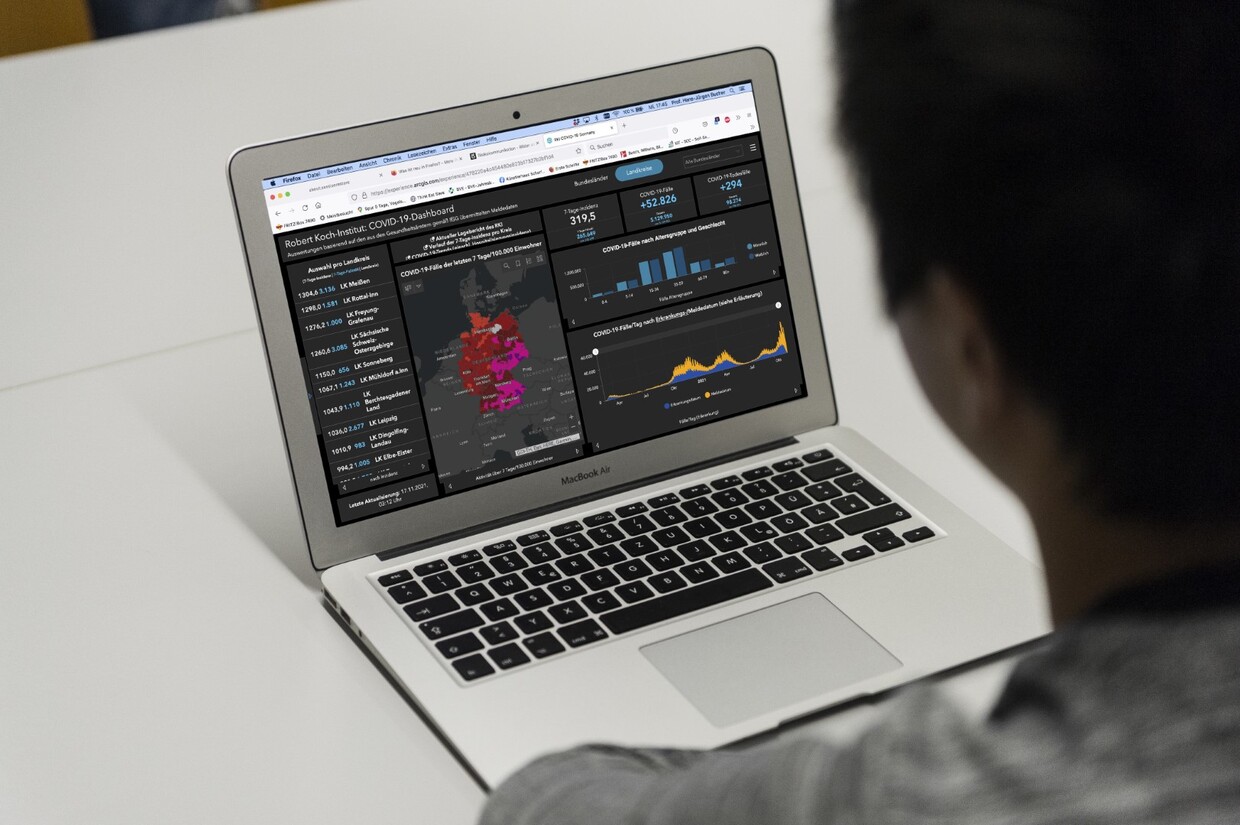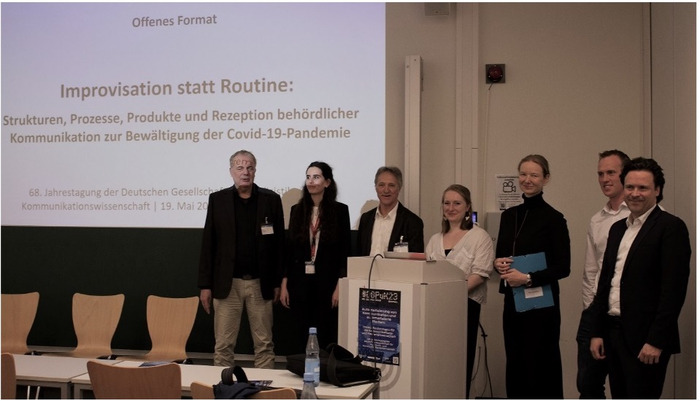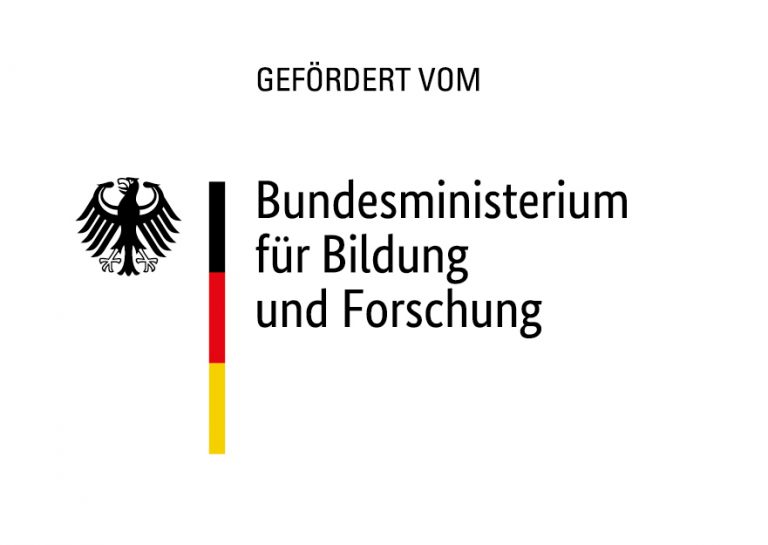MIRKKOMM – Analysis of the Perception of Multimodal Crises- and Risk-Communication through Citizens und Government Officials

The corona pandemic has shown that communication between authorities, the media, science and the population is a decisive factor in crisis management.
What are the criteria for successful communication that contributes to overcoming the crisis by strengthening the population's trust in state crisis management and promoting solution-oriented behavior?
The project "Analysis of the Perception of Multimodal Crises- and Risk-Communication through Citizens und Government Officials" has been investigating this question empirically from the addressee perspective since November 2021 - i.e. how citizens on the one hand and public authority employees on the other receive crisis information and what cognitive and affective effects this has on them. The project is helping to remedy the deficits in official communication that have arisen during the coronavirus pandemic in the future by providing information that is appropriate for the target group.
Laboratory Study and Online Survey for Multimodal Communication
The project at KIT is being led by Professor Dr. Annette Leßmöllmann, from the department of science communication as well as Professor (em.) Dr. Hans-Jürgen Bucher, who after his project recruitment at KIT was named a distinguished research fellow. The project is part of a research collaboration, which is being sponsored with more than 2 Mil. Euro to analyze the complex network, which is the crises and risk communication throughout a pandemic. This analysis is being carried out in eight subprojects from the perspective of different participants.
- Department of security at a state, federal and communal level
- Journalism
- Communicators in social media
- Judicial scientists
- As well as recipients, for whom the project at KIT is responsible.
A particular aim of scientific interest is concentrated in the so called “multimodal” sides of crises and health communication for example in the form of dashboards, social media content, novel video, and visualization formats. The interest here lies in studying how much and in what way they could be effective. To study this, the subproject at KIT will contribute through a meticulous laboratory study by the means of sight tracking and knowledge tests. Furthermore, an online survey for evaluation and acceptance of multimodal communication proposals and their contributions to the total scientific research interests will be carried out.
Because in crises situations institutions as well as citizens need to make business decisions, very often under uncertain and sometimes even controversial circumstances, there is a need to find out how information should be conveyed in order to increase belief and credibility. To address this issue the project team, including Bettina Boy and Johanne Mayer, falls back on experience from earlier projects from scientific communication.
Activities

-
Annual conference of the DGPuK's specialist groups for science communication and journalism/journalism research 2023.
-
Blog post on the presentation at the Annual Meeting of the German Society for Journalism and Communication Research (DGPuK) in Bremen, May 18, 2023.

Martin Löffelholz, Johanne Mayer, Hans-Jürgen Bucher, Johanna Radechowsky, Annett Schulze, Christoph Peter, Finn-Christopher Brüning
-
Panel, lecture and panel discussion: „Improvisation statt Routine: Strukturen, Prozesse, Produkte und Rezeption behördlicher Kommunikation zur Bewältigung der Covid-19-Pandemie“, eng.: "Improvisation instead of routine: structures, processes, products and reception of official communication to cope with the Covid 19 pandemic" (together with Martin Löffelholz).
-
Advanced training event at the Helmholtz Association: „In Krisen (angemessen) kommunizieren Teil 3: Rezeptionsbezogene Erfolgsfaktoren der Risiko‐ und Krisenkommunikation“, eng. "Communicating (Appropriately) in Crises Part 3: Reception-Related Success Factors ofRisk and Crisis Communication" (together with Annett Schulze, Martin Löffelholz).
-
BBK Expert Congress "Research for Civil Protection" World Conference Center Bonn - January 13, 2023. Presentation: „Soziale Medien in der Krisenkommunikation. Herausforderungen und Chancen für den Bevölkerungsschutz“, eng. "Social Media in Crisis Communication.Challenges and Opportunities for Civil Protection" (Joint panel with M. Löffelholz, A. Biegert: Governmental Risk and Crisis Communication: Success Factors, Warning Systems and Use of Social Media).
-
Forum Wissenschaftskommunikation, Organizer: Wissenschaft im Dialog, Hannover 18.10.2022. Lecture: "Coronapandemie: Wenn Wissenschaftskommunikation zur Krisenkommunikation wird", eng. "COVID-19 Pandemic: When science communication becomes crisis communication" (together with Annett Schulze, BfR and Christina Leuker, Robert Koch Institute).
- Schulze, A., Brand, F., Leschzyk, D.K. et al. Optimierung der Risiko- und Krisenkommunikation von Regierungen, Behörden und Organisationen der Gesundheitssicherung – Herausforderungen in lang anhaltenden Krisen am Beispiel der COVID-19-Pandemie. Eng.: Optimizing risk and crisis communication of governments, authorities and health security organizations - challenges in protracted crises using the example of the COVID-19 pandemic. Bundesgesundheitsblatt 66, 930-939 (2023). https://doi.org/10.1007/s00103-023-03708-1
- "Wie erreicht Politik die Menschen in der Corona-Krise? - Das MIRKKOM Forschungsprojekt erforscht die Wirksamkeit neuer Medien“, eng. "How does policy reach people in the Corona Crisis? - The MIRKKOM Research Project Explores the Effectiveness of New Media," interview with Hans-Jürgen Bucher in the Campus Report, Jan. 04, 2022..
- "Crisis Communication: Informing Credibly and Understandably." Mirage News 11/26/2021 .
- Tweet on the project launch by the German Federal Ministry of Education and Research, 11/25/2021 ..
- "Karlsruhe Institute Of Technology: Crisis Communication: Providing Credible And Understandable Information." India Education Diary 11/24/2021 .
- "Studie zu Krisenkommunikation: Wie gelingt glaubwürdige und verständliche Information?, eng. "Study on Crisis Communication: How to Provide Credible and Understandable Information?", PR Journal, 11/22/2021.
- "Corona: Die Probleme in der Krisenkommunikation", eng. Corona: The problems in crisis communication.", Sierks Media, 11/22/2021.
- "Mehr als Text: Mit Wissen durch die Covid-19-Pandemie“, eng. "More than text: With knowledge through the Covid 19 pandemic." Federal Institute for Risk Assessment press release, 11/22/2021..
- "Krisenkommunikation: glaubwürdig und verständlich informieren“, eng. "Crisis communication: providing credible and comprehensible information", Press release of the Karlsruhe Institute of Technology, 11/22/2021 ., also at Science Information Service (idw).
Project Profile
Duration: November 2021 to October 2024
Project coordination: Federal Institute for Risk Assessment (BfR)

Funding body: Federal Ministry of Education and Research (BMBF) within the framework of the program "Research for Civil Security".
Funding amount:
- Project network"Multimodality in Risk and Crisis Communication - Challenges, Evaluation and Optimization Options for the Content and Forms of Official and Media Information Communication" (MIRKKOMM), 2.1 million euros
- Subproject at KIT"Analysis of the Reception of Multimodal Crisis and Risk Communication by Citizens and Authority Employees", 418.000 Euro
Collaborative partners:
Participating scientists
